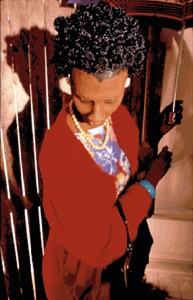
Juke Joint is an interactive, multimedia installation at Duke’s Center for Documentary Studies that brings to life the illegal liquor house that artist Willie Little’s father ran during the late ’60s and ’70s in Pactolus Township, near Little Washington, N.C.
“At six or seven I was like a sponge absorbing all the ‘goings-on’ in that tar-paper shotgun shack,” says Little. The installation uses artifacts, distressed walls, sculptured mannequins (pictured above), and a blues-filled narrative audio track to breathe life into the warm, humorous and sometimes seedy depiction of a slice of rural life. It re-creates the look and feel of a segment of Southern culture changed by the urban migration of African Americans and the commercialization of the blues. In their prime, many juke joints were 24-hour convenience stores and liquor houses combined. Customers could buy bread, milk, candy bars, and various sundries during normal hours. Late at night they could also buy corn liquor and name-brand alcohol in a setting conducive to good times. “During the day, my father’s place was known as Little’s Grocery, but when night fell, so did its mask of civic purpose,” says Little.
Born in 1961, Little received a bachelor of arts degree from UNC-Chapel Hill. Drawing from the traditions of North Carolina, his work celebrates what Little refers to as the “unsung things and people that are taken for granted.”
There will be an artist’s talk and “pie reception” on July 10 at 7 p.m. at the Center for Documentary Studies, with live finger-style guitar blue playing by Chuck Johnson. The installation will be up through Sept. 28. Call 660-3680 for details.

